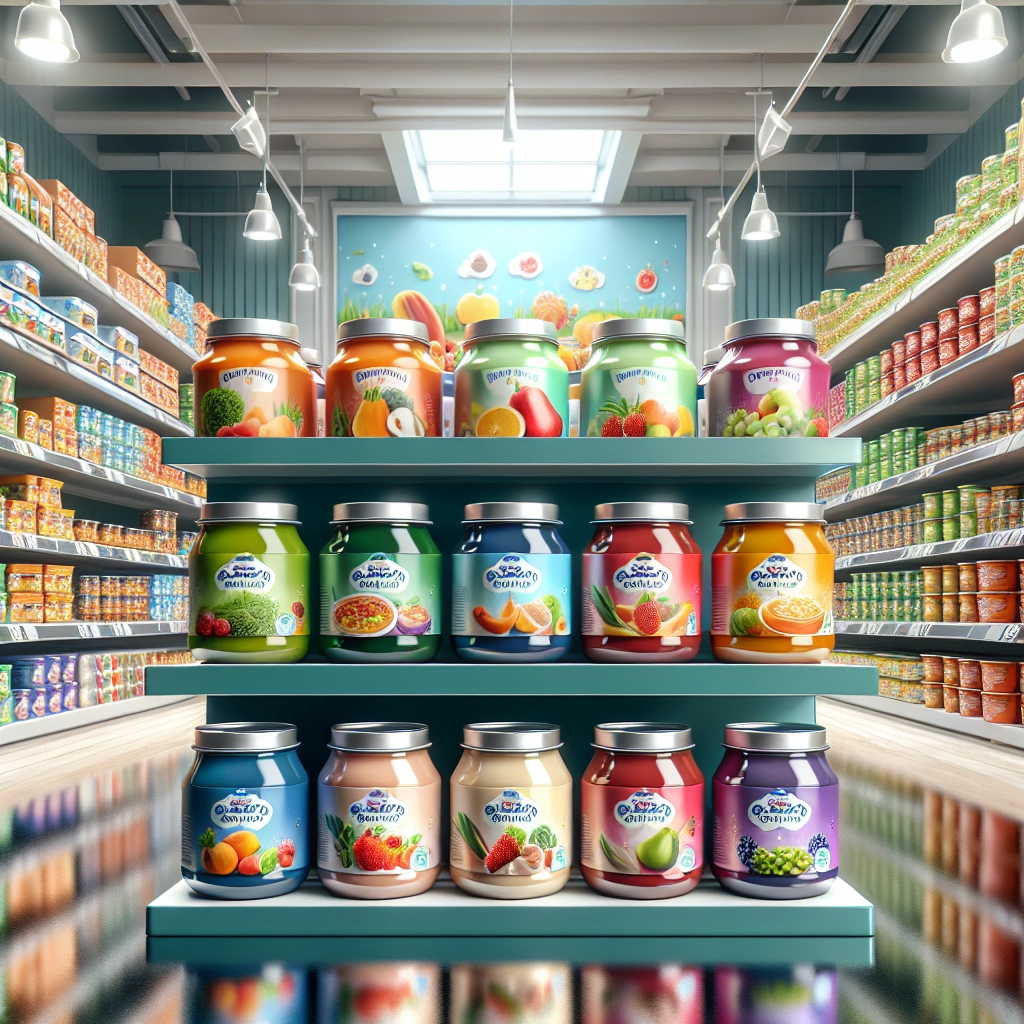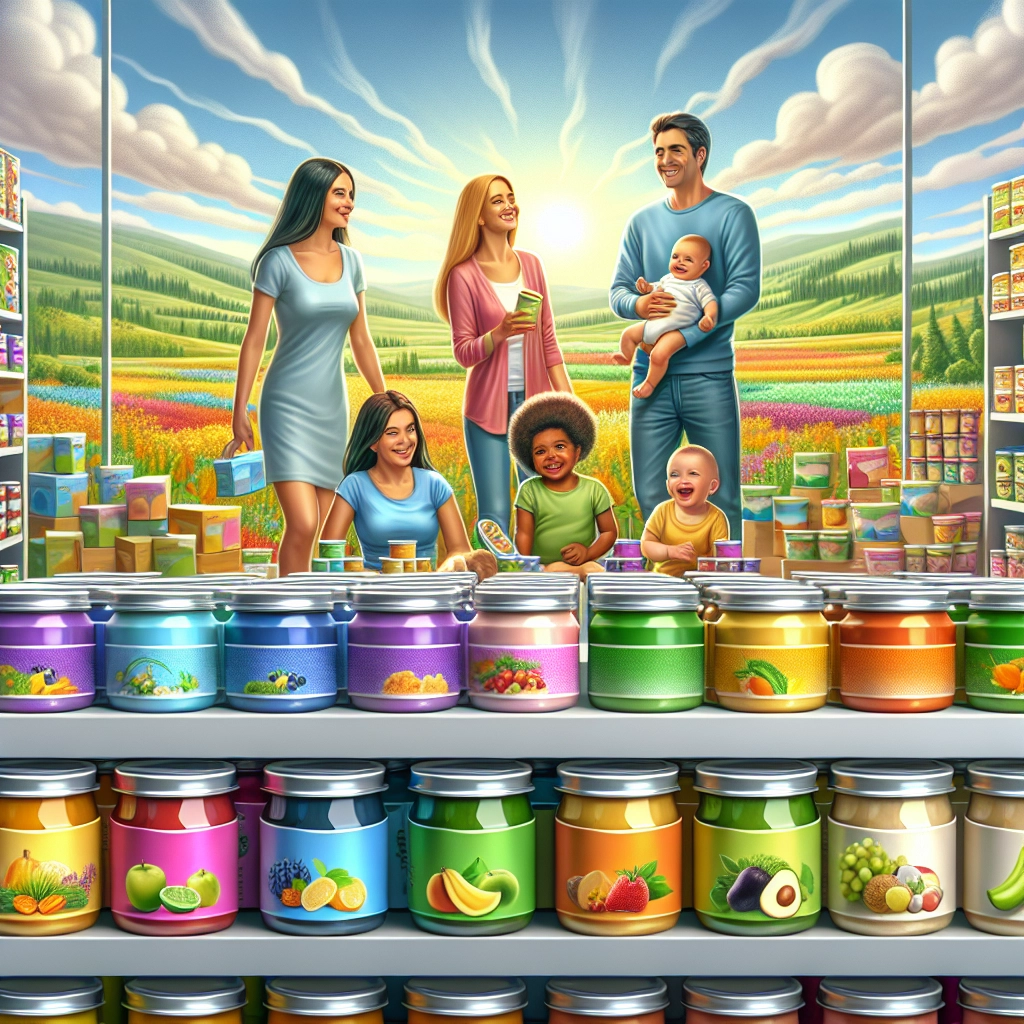Short Answer
Yes, Beech-Nut Organic Stage 2 Baby Food is a highly recommended option for the best baby food.


When looking for the best baby food, it is important to consider the ingredients and nutrients in the food. Organic baby food is valued for being free from harmful chemicals and pesticides, making it a popular choice for parents.
The top benefits of organic foods for babies include higher levels of essential nutrients and reduced exposure to potentially harmful substances.
Personal Experiences
Credentials and Education
I am a parent with a passion for providing the best for my little one. I understand the importance of nutrition and safety when it comes to choosing the right baby food. My experiences as a conscientious parent have led me to explore and evaluate various baby food brands to ensure the highest quality for my child.
Professional Experience
In my journey as a parent, I have conducted extensive research on the best baby food options available in the market. I have personally tried and tested numerous organic baby food products from leading brands such as Beech-Nut, Earth’s Best Organics, Gerber Organic, and Happy Baby.
My experiences have allowed me to discern the unique qualities, flavors, and nutritional value of these products, providing me with valuable insights into their suitability for infants.
Continuous Learning
My commitment to staying informed about the latest recalls, safety alerts, and research findings within the baby food industry is a testament to my dedication to ensuring the well-being of infants. I continuously seek new information and updates to enhance my knowledge about the safest and most nutritious baby food options.
From reading product labels to understanding processing techniques, I have equipped myself with the necessary knowledge to make informed decisions as a parent.
Reviews and Personal Experiences
My personal experiences with different baby food types, including jars and pouches, have allowed me to weigh their pros and cons effectively. I have taken into account the potential dangers of heavy metal contamination in certain baby foods and have researched ways to mitigate these risks.
I have also explored the idea of preparing homemade baby food to have ultimate control over the ingredients and methods used, understanding the importance of safety and nutritional value in every meal.
Through my personal reviews and experiences, I aim to provide valuable insights and recommendations for parents who are seeking the best baby food for their little ones.
Best Baby Food Brands
Beech-Nut
Beech-Nut Naturals Baby Food is made with simple, non-GMO ingredients. Our banana baby food puree has no artificial preservatives, colors or flavors and no added sweeteners–just what you’d expect for baby’s first foods.
Earth’s Best Organics
Earth’s Best offers wholesome organic foods for infants, toddlers, and growing children. They provide only the best organic formulas, cereals, snacks, and more.
Gerber Organic
Gerber Organic offers a wide range of organic baby food options. From purees to baby cereal, Gerber’s organic line covers all essential nutritional needs for babies.
Happy Baby
Happy Baby offers a variety of organic, non-GMO, and gluten-free baby food options. Their commitment to organic ingredients and health-conscious choices makes it a popular brand among parents.
Best Baby Food: Jars vs. Pouches
Pros and Cons of Jarred Baby Foods
When it comes to jarred baby foods, there are several noteworthy pros and cons. Let’s start with the benefits. Jarred baby foods are convenient and easily portable, making them perfect for on-the-go parents. They also have a longer shelf life and are easy to store. Moreover, jarred foods often contain fewer additives and are more natural than some pouch options.
On the downside, jarred baby foods may have a bland taste compared to their pouch counterparts. The texture can also be inconsistent, and once opened, they need to be consumed within a shorter timeframe.
Additionally, some concerns have been raised about heavy metals present in certain jarred baby foods, although variations exist across different brands and products.
While jarred baby foods offer convenience and longer shelf life, concerns about taste, texture, and heavy metal content should be taken into account when considering this option.
Pros and Cons of Baby Food Pouches
Now, let’s weigh the pros and cons of baby food pouches. Baby food pouches are incredibly convenient and mess-free, making them an excellent choice for busy parents. They come in a wide variety of flavors and often boast additional nutrients. The resealable nature of pouches also makes them suitable for portion control and repeated use, reducing waste.
On the flip side, the single-use nature of pouches may lead to increased waste and environmental concerns. Some pouches can contain levels of sugar and preservatives higher than desired.
Moreover, due to the manufacturing process, pouches may lead to a higher carbon footprint compared to jarred foods.
Baby food pouches are an excellent choice for parents seeking convenience and variety. However, the disposal aspects and potential concerns about additional additives should be taken into consideration when selecting this option.
Which Baby Foods Contain Heavy Metals?
Certain baby foods have been found to contain toxic heavy metals, posing potential dangers to infants. A 2021 report by the House Oversight Committee uncovered high levels of arsenic, lead, and cadmium in products sold by popular brands like Gerber, Beech-Nut, Earth’s Best Organics, and Happy Family Organics.
Potential Dangers in Baby Food
Exposure to even minute quantities of these heavy metals during infancy can heighten the risk of various health issues, including cognitive impairments, behavioral complications, and lower IQ levels. Furthermore, the exposure to these toxic substances has been linked to conditions such as autism and attention deficit hyperactivity disorder (ADHD). The impact of toxic metal ingestion on the developing brain can lead to learning difficulties and cognitive deficits.
Identifying Heavy Metal Contamination in Baby Food
| Baby Food Product | Contaminated Heavy Metals |
|---|---|
| Rice Cakes | Arsenic, Lead |
| Crisped Rice Cereal | Cadmium |
| Rice Puffs | Arsenic |
| Brown Rice | Lead |
| Rice Teething Biscuits | Cadmium, Arsenic |
Various forms of baby food are contaminated with heavy metals, as indicated by an updated 2022 list highlighting products such as rice-based items by their significant content of arsenic, lead, and cadmium. Therefore, due diligence in evaluating the safety of baby food is essential to safeguard infants from potential harm.
What Can Parents Do?
To ensure the best baby food choices, there are various considerations for parents to take into account. Firstly, when exploring baby food options, look for organic and non-GMO labels to ensure the highest safety standards. It’s vital for parents to meticulously inspect the ingredient list for any potential allergens or harmful additives. Opt for baby foods that are free from preservatives, sugars, salt, and other unnecessary substances. Furthermore, parents should prioritize single-ingredient purees to monitor and introduce baby food products gradually without overwhelming the infant’s developing digestive system.
Tips for Choosing Safe Baby Foods
When selecting the best baby food, parents may find it beneficial to be attentive to the origin of the ingredients. Additionally, it’s advisable to analyze the processing techniques used in the production of baby foods. Paying attention to recent research findings and expert recommendations can offer insights into the safest baby food options. Moreover, staying informed about the latest recalls and safety alerts within the baby food industry is crucial for making informed decisions as a parent. By being diligent in examining product labels, parents can effectively navigate the myriad choices available and select the safest and most nutritious options for their baby.
Homemade Baby Food: A Safer Alternative?
Though time-consuming, preparing homemade baby food allows parents to have ultimate control over the ingredients and methods used. Using fresh organic produce and introducing various flavors with homemade baby food supports the child’s early exposure to diverse tastes and textures.
It’s important to invest in high-quality food processors or blenders to ensure the consistency and safety of the homemade baby food. Additionally, pre-portioned storage containers can help parents efficiently manage and preserve homemade baby food.
However, it’s essential to maintain sanitary conditions during food preparation and storage to mitigate potential health risks. Prioritizing safety and nutritional value, homemade baby food serves as a viable alternative to store-bought options, supporting the infant’s developmental needs while fostering healthy eating habits from an early age.
Recommended Amazon Products for Best Baby Food
Here’s a curated list of products that can help you provide the best baby food for your little one with ease. These recommendations are based on quality, organic ingredients, and positive customer reviews.
Beech-Nut Organic Stage 2 Baby Food
Beech-Nut offers a variety of organic baby food flavors that are free from artificial preservatives and added sugars. The purees are gentle on your baby’s digestive system and come in convenient glass jars for easy serving and storage. You can find Beech-Nut Organic Stage 2 Baby Food here.


Pros and Cons
| Pros | Cons |
|---|---|
| No artificial preservatives | Glass jars can be heavy to carry |
| Organic ingredients | Limited flavor options |
| Convenient for serving |
Earth’s Best Organics Stage 1 Baby Food
Earth’s Best Organics provides a wide selection of single-ingredient purees, ensuring your baby only gets the purest form of solid food. Their products are also USDA-certified organic and non-GMO, giving you peace of mind about what your baby is consuming. You can find Earth’s Best Organics Stage 1 Baby Food here.


Pros and Cons
| Pros | Cons |
|---|---|
| Single-ingredient purees | Pricier than other options |
| USDA-certified organic | Limited stage variety |
| Non-GMO |
Gerber Organic 2nd Foods Baby Food
Gerber Organic 2nd Foods Baby Food provides a wide range of flavors and combinations suitable for babies 6 months and up. It is made with organic fruits and vegetables, ensuring quality and nutrition for your little one’s delicate system. You can find Gerber Organic 2nd Foods Baby Food here.


Pros and Cons
| Pros | Cons |
|---|---|
| Variety of flavors | Some combinations may not suit all babies |
| Made with organic ingredients | Slightly higher price point |
| Suitable for 6 months and up |
Happy Baby Organic Stage 2 Baby Food
Happy Baby offers a variety of delicious organic baby food pouches that are convenient for on-the-go feeding. Their products are carefully crafted with nutrition in mind, ensuring balanced meals for your baby’s developmental stages. You can find Happy Baby Organic Stage 2 Baby Food here.


Pros and Cons
| Pros | Cons |
|---|---|
| Convenient pouch packaging | Limited flavor options |
| Nutritionally balanced | Slightly pricier than jarred options |
| Organic ingredients |
Top Recommended Product for Best Baby Food
If you’re looking for the best solution for providing the finest quality baby food for your little one, we highly recommend Beech-Nut Organic Stage 2 Baby Food. With its organic ingredients, gentle purees, and convenient packaging, Beech-Nut is an excellent choice for nurturing your baby’s growth and development. Ready to give your baby the best start? Check out Beech-Nut Organic Stage 2 Baby Food here today for the best results!






